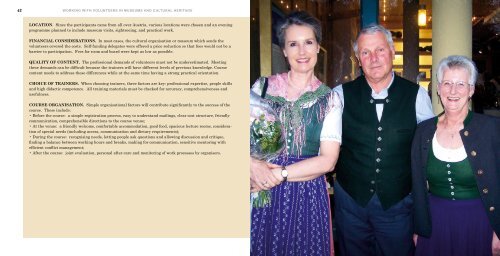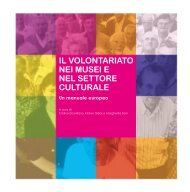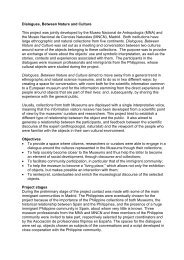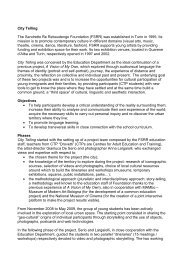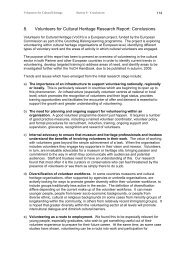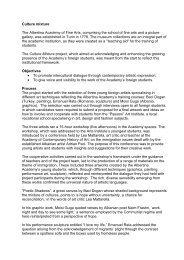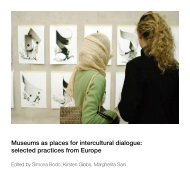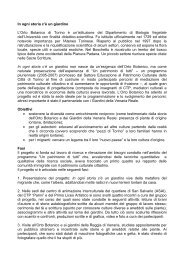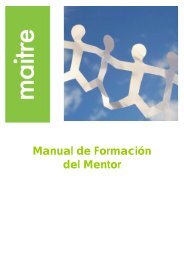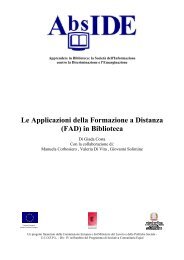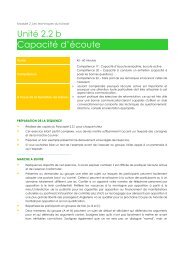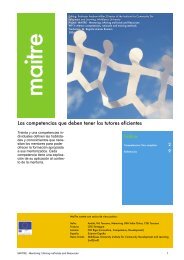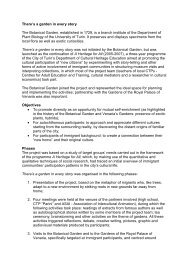62 WORK<strong>IN</strong>G WITH <strong>VOLUNTEERS</strong> <strong>IN</strong> <strong>MUSEUMS</strong> <strong>AND</strong> <strong>CULTURAL</strong> <strong>HERITAGE</strong>Location. Since the participants came from all over Austria, various locations were chosen and an eveningprogramme planned to include museum visits, sightseeing, and practical work.Financial considerations. In most cases, the cultural organisation or museum which sends thevolunteers covered the costs. Self-funding delegates were offered a price reduction so that fees would not be abarrier to participation. Fees for room and board were kept as low as possible.Quality of content. The professional demands of volunteers must not be underestimated. Meetingthese demands can be difficult because the trainees will have different levels of previous knowledge. Coursecontent needs to address these differences while at the same time having a strong practical orientation.Choice of trainers. When choosing trainers, three factors are key: professional expertise, people skillsand high didactic competence. All training materials must be checked for accuracy, comprehensiveness andusefulness.Course organisation. Simple organisational factors will contribute significantly to the success of thecourse. These include:• Before the course: a simple registration process, easy to understand mailings, clear cost structure, friendlycommunication, comprehensible directions to the course venue;• At the venue: a friendly welcome, comfortable accommodation, good food, spacious lecture rooms, considerationof special needs (including access, communication and dietary requirements);• During the course: recognising needs, letting people ask questions and allowing discussion and critique,finding a balance between working hours and breaks, making for communication, sensitive mentoring withefficient conflict management;• After the course: joint evaluation, personal after-care and monitoring of work processes by organisers.
64 WORK<strong>IN</strong>G WITH <strong>VOLUNTEERS</strong> <strong>IN</strong> <strong>MUSEUMS</strong> <strong>AND</strong> <strong>CULTURAL</strong> <strong>HERITAGE</strong> WORK<strong>IN</strong>G WITH <strong>VOLUNTEERS</strong> <strong>IN</strong> <strong>MUSEUMS</strong> <strong>AND</strong> <strong>CULTURAL</strong> <strong>HERITAGE</strong>65TRA<strong>IN</strong><strong>IN</strong>GFestivaletteratura of Mantua Maria Guida 1The Festivaletteratura (Literature Festival) of Mantua is dedicated to all those who love reading. It is now inits twelfth year and in that time has hosted almost 1,000 meetings with authors, theatre and music performances,and workshops for children and adults in different locations in Mantua. Every year the Festivaletteraturaenriches its programme with guided tours to the historical heritage sites of the city, poetry readings, performancesand meetings dedicated to art, architecture, design and illustrated books.The project started in 1997 thanks to eight volunteers – now members of the organisational committee – who createda non-profit association called Filofestival, whose aim is to organise and promote the Festival.From the beginning, the Festival has had a strong connection with the local community, especially regardingvolunteer participation: in 1997 there were 100 volunteers, today there are more than 600. Most of them are young(13-25 years), female (67%) and come from the Mantua area (65%, with 35% from other places in Italy and abroad).Volunteers are recruited through an online pro-forma, which can be used not only to apply but also to indicateone’s preferred sector and kind of activity, as well as previous experience and availability, which are the mainselection criteria. One of the Festival’s main aims is creating a fidelity relationship with volunteers, in orderto offer a long-lasting and continuous training experience and to strengthen the ties between the Festival andthe city. This objective has already been partially achieved: more than 70% of volunteers who participated inthe last Festival had volunteered also in previous ones.Volunteers’ motivations range from the will to have fun to the desire of being useful and of participating incivil life; they are based on personal cultural interests and on the need for socialisation. A very importantmotivation seems to be the development of personal and social skills, such as communication, team work orrealisation of graphic presentations; in some cases, also very specific competencies can be acquired, such aspromoting cultural and leisure activities or delivering socio-educational services.Training for the volunteers in most cases consists of two days of “in the field” training managed by experiencedvolunteers. For volunteers working with visual documentation, photography or videos, however, oneweek of training is provided. Another very peculiar feature of the Festivaletteratura is the kind of trainingactivities that it offers: they are useful programmes, accessible to everybody and not too demanding in termsof efforts required and of emotional involvement.During the Festival, volunteers undertake various activities: they are in charge of box-offices and informationpoints, they collaborate in preparing the different locations and the visual and photographic documentation,they manage the Festival’s website and they take care of many organisational aspects related to the authors’presence in Mantua as well as some of the secretarial work.Volunteers from other cities are hosted by members of Filofestival; all volunteers have insurance and are identifiedby a blue T-shirt which they wear during the Festival. Volunteers receive board and lodging but theirexpenses are not reimbursed. There is one person in charge of managing volunteers and each activity has adifferent coordinator.Young people recognise the Festivaletteratura as a training experience which provides them with new skillsand improves previous ones: for the great number of young people who every year participate this is surelyone of the key areas which explains its great success. Since it is an annual event which lasts only one week, ithas a low impact in terms of school or university duties while at the same time offering new and stimulatinglearning and training opportunities – as well as social ones.Critical issues related to volunteering during the Festival which have emerged during the years are mainlyrelated to the limited possibility which the small city of Mantua has in terms of hospitality. Due to these constraints,it is not possible in the short term to increase the number of volunteers. Another critical point is thelow number of adult and elderly volunteers.NOTE1 - From an interview with Alessandro Della Casa, the Festival’s Volunteer Coordinator.


